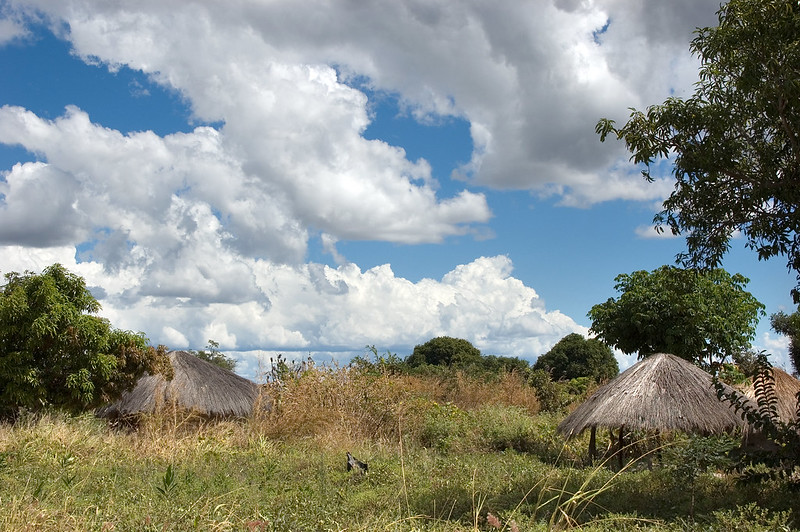By Kaala B. Moombe, Esnelly Katongo, and Sandra Cordon

Between March and September 2023, the COLANDS Zambia team, in collaboration with their CIFOR-ICRAF partners, organized participatory mapping events, presented research and project results to stakeholders at district, village and community levels for further discussion, and facilitated workshops on writing manuscripts for academic journals. The team also supported community validation of a Theory of Change (ToC) for Kalomo landscape.
In March 2023, COLANDS team researchers shared project results drawn from biodiversity assessments of vegetation and birds, conducted in late 2022, at the Kalomo District level in several clusters of village landscapes. Later, in sessions held 23-29 May 2023, the COLANDS team met with Kalomo chiefdoms of Chikanta, Sipatunyana, and Siachitema to share these project results. Some 122 participants from all four clusters involved in the research – Mantanyani, Siabalumbi, Mudenda, Bbilili – joined in the sessions. Another results-sharing event with 48 participants was held in Livingstone for Zambia’s Southern Province two days later.
The biodiversity assessments also included soil surveys conducted in October and November 2022 in several clusters of village landscapes, including:
- the Mudenda cluster of four village landscapes in Nkandanzovu, Chikanta Chiefdom, Kalomo District;
- 22 village landscapes in the Siabalumbi cluster and four in the Mantanyani cluster, all located in Sipatunyana Chiefdom, Kalomo District;
- 12 village landscapes in the Bbilili cluster in Siachitema Chiefdom, Kalomo District.
During these assessments, the team interacted with a total of 797 community members, almost 53 percent of those female.
Writing workshop
From 12-14 July 2023, COLANDS facilitated a writing workshop in Kitwe on drafting journal manuscripts on biodiversity, participatory and historical mapping, and bird surveys. Some 16 participants joined from Copperbelt University, the district departments of forestry, livestock, agriculture, as well as the National Heritage Conservation Commission. Four draft articles are being developed on local perceptions of land use and land cover changes, carbon stocks modelling (allometric models), variations in florals/plant assemblage, and monitoring landscape changes using birds.
On 16 July 2023, the COLANDS team met with the Kalomo Town Council chair and representatives from the district forestry office to discuss implementation of the COLANDS extension work plan. A workshop to review the Kalomo Integrated District Plan (IDP) was a particular focus. On that same date in Choma, COLANDS took part in a Provincial Development Coordinating Committee (PDCC) meeting.
The following month, COLANDS supported training on how to organize community forest management groups for district forestry officers from Kalomo and neighbouring districts, as well as village headmen from the COLANDS clusters. The training, with 31 participants, aimed to enhance the knowledge, skills and capacity of local forest managers, including community-level traditional leadership, government officers, and local government structures. Facilitated by national and provincial forestry departments, which are CIFOR-ICRAF partners in COLANDS, the training held 26-31 August 2023 also covered community forest management concepts, processes and principles.
Kalomo development plan review
A review of the Kalomo IDP, and development proposals from meetings in Choma and Kalomo held 11-12 September 2023 and 13-14 September 2023, respectively, included:
- plans for an analysis of status of land use land cover and change;
- a carbon analysis of Kalomo vegetation formations and potential for a carbon credit enterprise;
- information on capability of Kalomo landscape for restoration, rangeland, crop production and water catchments; and
- inclusion of issues highlighted, such as funding, collaboration, organic crop production.
Draft development proposals included:
- promotion of sustainable, climate-smart forest enterprise development
- afforestation and reforestation
- climate-smart agriculture
- promotion of irrigation
- rangeland management and pasture production water quality.
These proposals arose from a ToC developed in February 2020.
A ToC validation study was conducted in 13 villages, some of which were included in COLANDS clusters across the three chiefdoms of Kalomo District, and concluded with a validation workshop on 5 September 2023 in Choma that was attended by traditional leaders and community members, government actors, the private sector, civil society, researchers, and the media. The study had aimed to corroborate the findings of a previously co-produced ToC for the future management of the Kalomo District, and involved interviews and focus group discussions with diverse stakeholders in the field – and principally with those who were not present at, or opted out of, the previous stakeholder ToC development process.
Also in September 2023, COLANDS carried out biodiversity assessments on a private commercial farm. The assessments came out of discussions with commercial farmers and private-sector entities in December 2022 concerning their perspectives on ILAs and comparisons of the private commercial farm model versus customary landscape management models. At that time, COLANDS was invited to conduct biodiversity assessments on two permanent sample plots that commercial farmers had established 25 years ago.
Late in September, the team carried out vegetation-assessment mapping involving three plots along the Nazhila River landscapes system, and also conducted participatory mapping for 15 villages in the same landscape. This work followed two capacity-building workshops organized by the COLANDS team between April and August 2022. Participatory mapping proved to be an excellent tool for unravelling stakeholder perspectives of landscape dynamics and trade-offs, which are essential to understand when implementing integrated landscape approaches (ILA).




